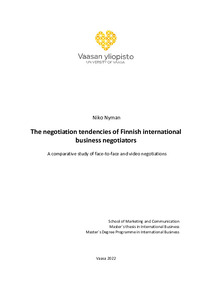The cultural aspects of international business negotiations - A case study of Finnish-Russian business negotiations
Juosila, Juha (2005)
Kuvaus
Kokotekstiversiota ei ole saatavissa.
Tiivistelmä
Understanding cultural differences is critical to the success of firms engaging in international business. The main objective of this study is to analyze the business negotiations in Russia, and especially how the different cultural aspects affect the business negotiations between the Finnish and the Russians. The key cultural elements in the international business negotiations studied here are communication, values, attitudes, thinking and decision-making processes. Also Hofstede’s cultural dimensions are studied.
In addition to cultural factors the context or "frame" in which these negotiation processes take place is studied. This is done by studying the background factors and the situational factors. The background factors are objectives, negotiating strategies, and the negotiators. The situational factors are the newness of the situation and the negotiating tactics. The business negotiation process is studied by using the process model developed by McCall and Warrington (1989). They divide the negotiation process into five stages: pre-negotiation stage, distributive bargaining stage, integrative bargaining stage, decision-making and action stage, and post-negotiation stage.
The empirical part of the study contains six case studies, all of which are Finnish companies or Finnish subsidiaries of international companies with considerable experience of face-to-face sales negotiations with the Russians. The companies were all from the transport and haulage branch. The study and the personal interviews is made by using a pre-planned question list developed based on the the theoretical framework. One of the key conclusions is that the features and elements of both strategies or approaches (distributive and problem-solving) are often found in the international business negotiations. The overall conclusion of the empirical study is that the distinguishable features of Russian culture, and especially their effects on business negotiations are diminishing. The negotiation process model used in this study was not found to be entirely applicable to the negotiations in the transport and haulage branch. A developed model is introduced in the end of the study.
In addition to cultural factors the context or "frame" in which these negotiation processes take place is studied. This is done by studying the background factors and the situational factors. The background factors are objectives, negotiating strategies, and the negotiators. The situational factors are the newness of the situation and the negotiating tactics. The business negotiation process is studied by using the process model developed by McCall and Warrington (1989). They divide the negotiation process into five stages: pre-negotiation stage, distributive bargaining stage, integrative bargaining stage, decision-making and action stage, and post-negotiation stage.
The empirical part of the study contains six case studies, all of which are Finnish companies or Finnish subsidiaries of international companies with considerable experience of face-to-face sales negotiations with the Russians. The companies were all from the transport and haulage branch. The study and the personal interviews is made by using a pre-planned question list developed based on the the theoretical framework. One of the key conclusions is that the features and elements of both strategies or approaches (distributive and problem-solving) are often found in the international business negotiations. The overall conclusion of the empirical study is that the distinguishable features of Russian culture, and especially their effects on business negotiations are diminishing. The negotiation process model used in this study was not found to be entirely applicable to the negotiations in the transport and haulage branch. A developed model is introduced in the end of the study.
Kokoelmat
Samankaltainen aineisto
Näytetään aineisto, joilla on samankaltaisia nimekkeitä, tekijöitä tai asiasanoja.
-
The negotiation tendencies of Finnish international business negotiators : A comparative study of face-to-face and video negotiations
Nyman, Niko (08.09.2022)
Pro gradu -tutkielmaCompanies have increasingly chosen to enter international business in the face of growing and intense competition. Businesses worldwide have restricted face-to-face contact and negotiations since the beginning of the ... -
The elements and tactics of Finnish negotiators in international business negotiations : the impact of face-to-face and video negotiation
Altis, Mira (2022)
Pro gradu -tutkielmaDue to increased globalization and resulting intense competition, more and more companies are entering into international business. Entering international business through export modes, as well as through intermediate and ... -
CROSS-CULTURAL BUSINESS NEGOTIATIONS Case: Finnish, Spanish and Portuguese Business Negotiations
Timo, Minna (2005)
Pro gradu - tutkielmaThe main objective of the present study is to examine whether national culture affects the negotiating behaviour of the Finnish, Spanish and Portuguese businessmen, and to understand as well as explain how it shows in ...

